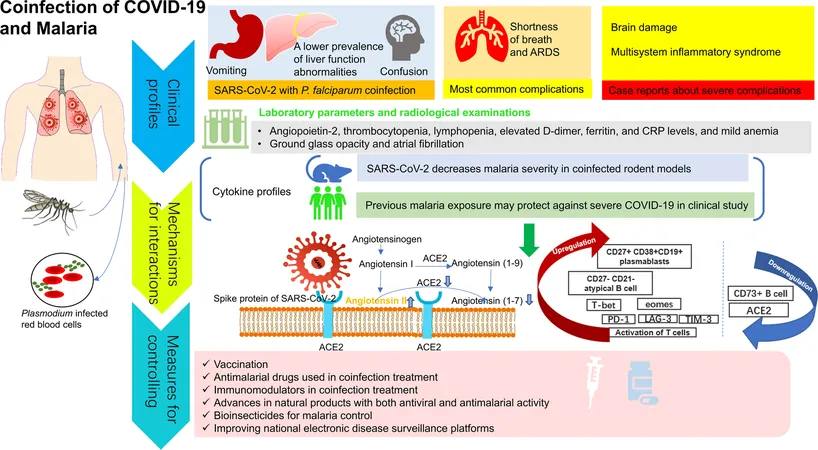
The Unexpected Battle: COVID-19 and Malaria Coinfection - What You Need to Know!
2025-03-25
Author: Jia
Introduction
The COVID-19 pandemic, triggered by the SARS-CoV-2 virus, has significantly impacted global health, resulting in over 773 million confirmed cases and more than 6 million deaths as of May 2024. This health crisis has also disrupted various other areas of healthcare, including the management of endemic diseases like malaria. In 2022 alone, the World Health Organization (WHO) reported approximately 249 million cases of malaria worldwide, a surge from the 247 million cases reported in 2021. This surge can partly be attributed to the disruptions in healthcare services and treatment caused by the COVID-19 pandemic.
Impact on Malaria Cases
Interestingly, while malaria cases surged globally, areas not endemic to malaria, such as Germany and Switzerland, observed a significant decline in imported malaria cases during the pandemic's early stages. However, travel restrictions eventually led to a rise in cases, resulting in delays in diagnosis and treatment, particularly for patients with concurrent COVID-19 infection.
Transmission and Symptoms
Malaria is primarily transmitted through the bites of infected Anopheles mosquitoes and leads to numerous clinical symptoms including fever, chills, and headaches. Complicated cases often result in severe conditions like anemia or cerebral malaria, which can lead to death.
Underdiagnosis during the Pandemic
During the pandemic, COVID-19 symptoms often overshadowed those of malaria, causing underdiagnosis in many patients. Notable cases include severe malaria not being diagnosed until after days of failed COVID-19 treatment, highlighting the importance of vigilance for co-infections. Health professionals need a robust understanding of the interactions between these two diseases, especially in low- and middle-income countries (LMICs) where healthcare systems are already strained.
Research and Immune Response
Research indicates that a combined response to both diseases may be necessary. For example, specific immune responses to prior malaria exposure could modulate the severity of COVID-19, while studies show that certain genetic factors, like the ACE2 receptor, influence both diseases. The response to the infections can vary based on immune system history, with malaria exposure potentially offering some protection against severe COVID-19 outcomes.
Challenges in Treatment
Moreover, the cytokine storm often seen in severe cases of both diseases presents a significant treatment challenge. It is crucial for healthcare systems to develop synchronized and efficient diagnostic processes for both malaria and COVID-19, especially in regions where these diseases coexist.
Innovative Treatments
Innovative treatments, including the use of monoclonal antibodies and corticosteroids, have emerged as potential therapeutic avenues for managing coinfections. These treatments are currently being evaluated for their efficacy against both SARS-CoV-2 and malaria parasites.
Advancements in Malaria Control Strategies
Interestingly, the pandemic has also opened up opportunities for advancing malaria control strategies through novel bioinsecticides and enhanced surveillance systems for infectious diseases.
Conclusion
Despite the challenges posed by the COVID-19 pandemic, it emphasizes the need for resilience and innovation in global health strategies to address the complexities of coinfections like malaria and COVID-19. As diseases evolve, so too must our strategies for combating them, ensuring global health systems are better equipped for future health crises.
Call to Action
Stay informed and keep an eye on the evolving landscape of infectious diseases - the battle against COVID-19 and malaria continues, and your awareness can make a difference!


 Brasil (PT)
Brasil (PT)
 Canada (EN)
Canada (EN)
 Chile (ES)
Chile (ES)
 Česko (CS)
Česko (CS)
 대한민국 (KO)
대한민국 (KO)
 España (ES)
España (ES)
 France (FR)
France (FR)
 Hong Kong (EN)
Hong Kong (EN)
 Italia (IT)
Italia (IT)
 日本 (JA)
日本 (JA)
 Magyarország (HU)
Magyarország (HU)
 Norge (NO)
Norge (NO)
 Polska (PL)
Polska (PL)
 Schweiz (DE)
Schweiz (DE)
 Singapore (EN)
Singapore (EN)
 Sverige (SV)
Sverige (SV)
 Suomi (FI)
Suomi (FI)
 Türkiye (TR)
Türkiye (TR)
 الإمارات العربية المتحدة (AR)
الإمارات العربية المتحدة (AR)